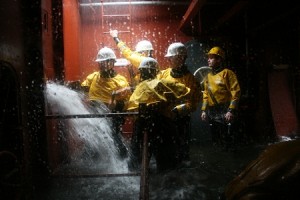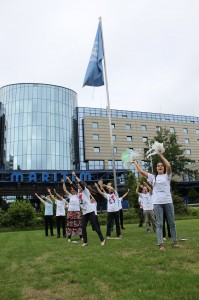Some thoughts on how to get somewhere when you’re going nowhere
This story was first posted on the UKYCC blog
Today is a day of getting nowhere but needing to get somewhere. So, in an effort to put forward solutions instead of criticisms, here are 5 suggestions for moving negotiations forward:
1) Get to know each other through team-building activities.
I’d suggest something like the services provided by the National Maritime College of Ireland. In particular I recommend their ‘Escape to Victory’ exercise where, according to their website,
“Team members must work together to repair all cracks and holes in the sinking ship. People must use hammers, wedges and quick thinking to concur this physically and mentally draining task. This is a timed exercise were all team members must work together as many hands really do make light work for this challenge.” (1)
2) Laugh more.
Saudi Arabia should provide a good source of material for this.
3) Build the trust.
There’s lots of ways to build trust with colleagues, but I’d suggest taking the same tactic as the Egyptian Executive Director of UNEP 1987 who
‘… put the 15 or so key negotiators in the worst room in the conference centre and keep them there till they reached agreement.’ (2)
Any suggestions for the worst room in the Maritim?
4) Take regular breaks for energizers.
YOUNGO would be more than happy to lead these sessions, particularly the following games:
- Jazzy bananas,
- Zip Zap Boing,
- BANG!,
- Animal reverse-charades,
- High Goals,
- The stalker game’
- ‘The Pony song’…
5) Begin a process of daily evictions a la reality TV programmes.
Nothing would give people a kick up the rear like the risk of being chucked out of the negotiations for being totally rubbish. The winner gets all the half price cocktails and free peanuts in the Piano Bar that they want. I wonder who would be evicted first……
(1) http://www.nmci.ie/teambuilding
(2) http://www.iofc.org/node/44761
Some thoughts on how to get somewhere when you’re going nowhere
Read post →For some, working on adaptation projects or pushing for adaptation to be included in climate negotiations is an admission of defeat.
For many people I know adaptation in a climate change context is a much-avoided issue. This may sound a strange concept, but to some, the acceptance that anyone should be working on adaptation projects or pushing for adaptation to be included in climate negotiations is an admission of defeat. It signals to the outside world (and worse, to ourselves) that climate change is affecting people, and therefore our efforts to mitigate those effects have fallen short.
Up until I joined Practical Action recently, I was one of these ‘adaptation avoiders’.
It wasn’t that I was against adaptation – not at all. It was that I succumbed to a contradiction that much of the NGO world perpetuates on a daily basis. We continually push the idea that climate change is happening now, that it is no longer something that will be faced by conceptual ‘future generations’ but something that people around the world today must face head-on. At the same time, however, many refuse to talk about adaptation as part of their campaigns or work because it means facing up to this fact for ourselves and that is a scary thing to do.
Adapation, from what I can see, means to many an urgent scrabble to help people cope with extreme events that happen to them. But over the past few weeks, I’ve come to see that adaptation doesn’t have to mean sticking a plaster over new wounds caused by climate change. Actually, adaptation can mean several things – often all combined – including
- Being an opportunity to create and implement projects that allow people to overcome the climatic changes that have already occurred,
- Enabling people to continue on a path of development in a way that is sustainable in the long term,
- Making people more resilient to the continuing, and worsening, effect of climate change.
Take, for example, Practical Action’s work with floating gardens. In countries like Bangladesh, regular flooding leaves land either inaccessible or of poor quality, making agriculture very difficult. Floating gardens allow people to continue to grow food even when the floods are at their highest, helping to keep a family fed as well as providing a source of income through the sale of surplus produce.
Similarly in Sri Lanka, Practical Action has been working with farmers to raise the profile and use of indigenous varieties of rice which require less fertiliser, are highly nutritious and are resistant to even severe droughts. By being able to grow this rice, farmers are able to provide food for their families, as well as selling extra to boost the local economy and provide them with extra income which can further expand agricultural production, pay for education or be used for other measures that increase the family’s resilience against climate change.
These are solutions that won’t just overcome the short-term challenges people face, they are solutions that begin the journey along the lengthy road out of poverty.
This revelation may not be new to some, but as I return to the UN I’m struck once again by the focus most people place on capping emissions in order to prevent (or mitigate in the local jargon) climate change from happening. I can see, as I talk at length about the work that Practical Action does, the same realisation that I experienced a few weeks ago dawning across the faces of those I am talking to. They too can see that adaptation doesn’t always mean fire-fighting in a losing battle. It brings into play a new means of development that is truly ‘sustainable’, taking into account not only the challenges that climate change poses now but also that it will pose in the future.
For some, working on adaptation projects or pushing for adaptation to be included in climate negotiations is an admission of defeat.
Read post →About the author
Ellie Hopkins
Ellie is UK based and works on climate issues as part of the UKYCC and Practical Action. ukycc.org PracticalAction.org







